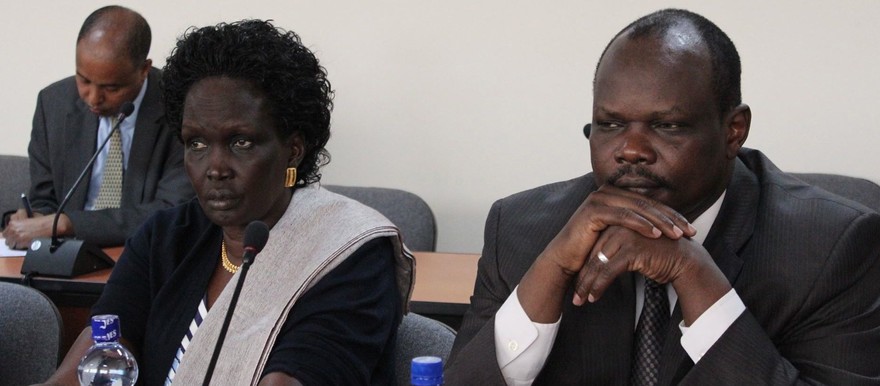The former secretary-general of South Sudan’s ruling party SPLM, Pagan Amum, says that the group of politicians referred to by the mediation as ‘SPLM Leaders (Former Detainees)’, will participate at political talks in Addis Ababa as an ‘equal stakeholder’ to the government and armed opposition.
Prior to the December violence, the former detainees were allied to the former party deputy chairman, Riek Machar. But the first seven of the group upon their release declared themselves as a ‘third bloc’ not loyal to either side in the conflict, despite initially having been named by Machar as members of his delegation.
After meetings between the SPLM/A-in-Opposition and the former detainees, the Sudan Tribune reported yesterday that the two groups “have been in consultations… whether to join ranks under one organization, or remain separate groups.”
But in his own remarks on Tuesday, Pagan hinted that the detainees’ group will not join the rebel movement headed by Machar. He appeared at a press conference with the IGAD mediation together with both the ‘group of seven’, who were released in January, and the ‘group of four’ released in April, alongside also Rebecca Garang, the widow of SPLM/A chairman John Garang.
The group of four – Amum, Ezekiel Gatkuoth, Majak d’Agoot and Oyai Deng – were cleared of treason charges last month and released from custody of the National Security Service.
Amum in his remarks endorsed the agreement signed last Friday by Riek Machar and President Salva Kiir, which put in place a ceasefire, saying his group would urge both sides to comply with the agreement. But he suggested the ex-detainees will not join the talks under the banner of either warring group.
The head of mediation, Ambassador Seyoum Mesfin, welcomed the participation of the former detainees group into an “inclusive political dialogue to resolve the crisis in South Sudan,” saying he expected the group to contribute positively.
“The genesis of the crisis has been the crisis at the [SPLM] party’s leadership level, although now it’s not relegated or limited to the party leadership, it’s a national crisis,” he said, before inviting the SPLM leaders to give their reflections on the way forward.
Mesfin noted that besides the two warring parties, other political forces “would have to participate through various modalities” at the peace talks.
Although the South Sudanese government delegation earlier this year fiercely resisted the inclusion of the former detainees in peace talks, they later conceded to allow a parallel forum, the SPLM intra-party dialogue, in which they could participate, though not in talks on security issues.
With a new ceasefire signed on 9 May, the scope of that participation is potentially widening, driven in part by the mediation itself. The ambassador stressed that Kiir and Machar have themselves agreed that the other political forces will be participating in political negotiations, saying they “made it emphatically clear that the participation of stakeholders would be throughout the negotiation process.”
“This cannot be postponed… the participation of all stakeholders through various modalities must be ensured from the very beginning while negotiating for a transitional arrangement as well as for the permanent constitution process,” said Mesfin on Tuesday.
‘Equal stakeholder’ in the political process
With regard to the negotiations, the chief mediator added, “The warring parties are the parties that should and must negotiate and bring the fighting to an end. But with regard to the political process, all stakeholders would have their role and must play their role to achieve the broadest possible endorsement of the solution being solved for South Sudan.”
Amum, addressing the same gathering at the invitation of the mediator, stated, “As SPLM leaders, we are going to participate and engage first and foremost the two parties to stop this war and this conflict, so that we proceed with the negotiation to develop and agree on programmes to urge South Sudan into a transition to peace and democracy.”
“We are going to participate as an equal stakeholder and partner with the SPLM-in-Government and the government delegation, SPLM/A-in-Opposition and the SPLM Leaders together with representatives of our civil society and faith-based and church leaders,” he said.
Amum added that the purpose of this participation would be “to agree on a transitional arrangements including a transitional constitutional framework, a transitional programme,” and, by implication, a transitional government.
He added, “The SPLM Delegation [of Former Detainees] here is going to work with both parties to bring an end to this war and will be engaging the warring parties as well as engage in the development of this transitional processes necessary to usher our country, South Sudan, back into peace and democracy.”
Photo: Rebecca Garang (left) and Pagan Amum (right) at a meeting with the SPLM-G11 and IGAD mediators, 13 May 2014 (IGAD)




